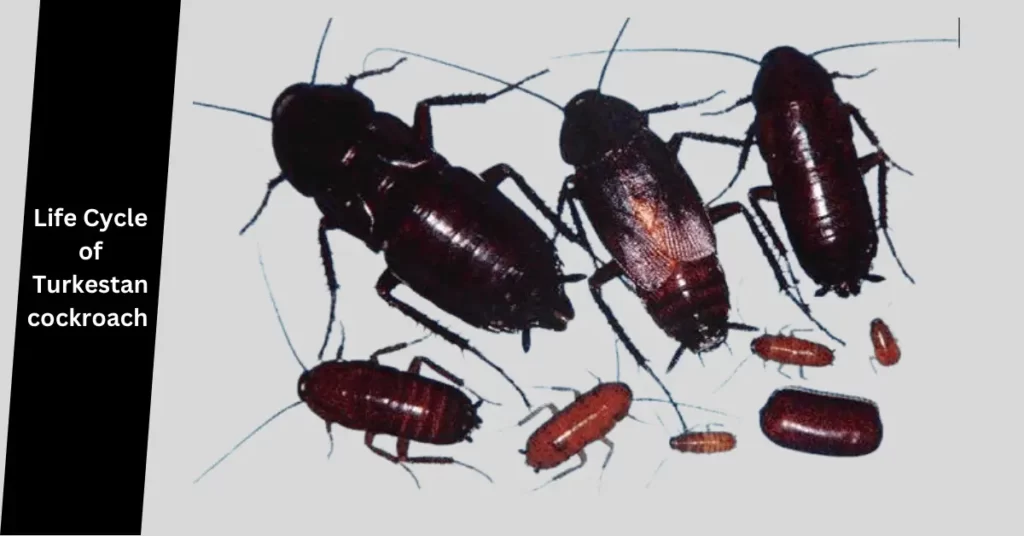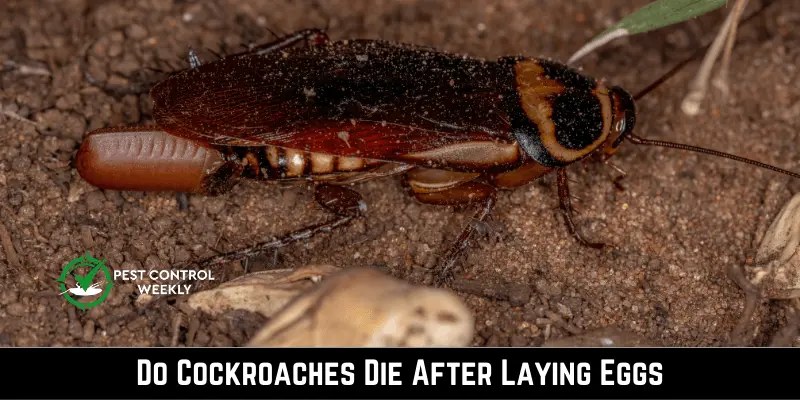Have you ever seen cockroaches wandering in your home and kitchen? If so, you must know that these critters carry egg sacs to increase their number. Point to be pondered now; do cockroaches die after laying eggs?
No, cockroaches don’t die after laying eggs. One female cockroach can breed up to 13 more times with an egg sac containing up to 40 eggs each time. That means, throughout her whole life, she will have produced more than 400 cockroaches.
Do you want to know more about the cockroach life cycle? Read the below guidelines to get a sneak peek about it.
Cockroach Life Cycle
According to the Journal of Medical and Veterinary Entomology, cockroaches are among the most primitive insects in America. Understanding the life cycle of cockroaches is necessary to overcome their infestation. The cockroach life cycle has three stages; eggs, nymphs, and adults.

Stage 1- Eggs
As you already know, every lifecycle begins with an egg, so cockroaches are no exception. Cockroaches only need one to three days to lay their eggs after mating. The female cockroaches protect their eggs from the air using their saliva. Due to their tiny size and difficulty in identification, you can’t discover these eggs.
Stage 2- Nymphs
After female cockroaches lay their eggs, it takes almost 30 days to hatch. Although these nymphs resemble conventional roaches, they are smaller and lack fully formed wings. Additionally, they have pale color and move quickly compared to adult cockroaches.
Stage 3- Adults
It is the final stage of the cockroach lifecycle. Adult cockroaches are the fully developed pests that you used to hate. These roaches may reproduce and have completely formed wings and antennas. If you see any adult cockroaches inside your home, take immediate action to prevent their growth.
Different Cockroach Species Egg Specifications
Although all species of cockroaches have the same stages of the lifecycle, they have some differences in their eggs. Here are some specifications of their eggs.
| Species of Cockroaches | Eggs Identification | Laying Time of Eggs | Eggs Location |
| American Cockroaches | ⅜ inch-long and are bigger than german roaches | Eggs are hatched after being deposited for 6 days | Wood piles, garage, food supplies |
| Oriental Cockroaches | Dark brown and black, ½ inch-long | Female roaches hatch their eggs after deposition of 12 hours to 5 days | Warm areas with a rich supply of food |
| Turkestan Cockroaches | ½ inch long and are dark brown to black with yellow markings | Eggs are hatched after being deposited for 1-day | Underground water and sewerage system |
| Australian Cockroaches | Dark brown, 11mm long | Female roaches hatch their eggs after deposition of 30-40 days | Gaps and holes in walls, warm areas having a rich supply of food |
| German Cockroaches | Pursed-shaped, light brown, and ¼ inch-long | Eggs are hatched after being deposited for 28 days. | Bathroom, kitchen, pipes, and cracks in walls |
What Happens When Cockroaches Lay Eggs?
Seeing a cockroach in your house is not a pleasant thing. If you notice a roach in your kitchen, there must be a likelihood of more cockroaches. As mentioned, the cockroach’s lifecycle moves from an egg stage to an adult one.
Cockroaches used to lay their eggs in warm and humid areas of your house, like drainage systems, vents, kitchens, and bathrooms. German cockroaches lay a large number of eggs than other roaches. After laying eggs, cockroaches protect their eggs from external conditions using their saliva. These eggs hatch after being deposited for 30 days.
Once the eggs are hatched, the little cockroaches named nymphs haven’t fully functional wings and are lighter in color. The nymphs experience several different sub-lifecycles and become large until they reach the adult stage.
Do Cockroaches Give Birth When They Die?
No, roaches don’t give birth after being dead, as long as you kill them correctly. This myth probably began because female cockroaches that died had ootheca inside of their bodies. It may result in the hatching of several nymphs after the death of cockroaches.
Roaches’ eggs may destroy if you squash them or use a suitable insecticide, which will also stop the eggs from laying. Only those eggs of cockroaches don’t end up being crushed along with their mother because they are not ready to hatch. As a result, without their mother’s nutrition, the eggs also perish.
Above all, insecticides or natural cockroach repellents may kill roaches’ eggs by damaging their ootheca.
Does Killing a Cockroach Spread Eggs?
No, killing a cockroach doesn’t spread its eggs. It’s a myth that their eggs will crush when you kill cockroaches by squishing them. They don’t die because of the presence of a protective cover called ootheca around the eggs.
The female cockroaches spread these oothecae throughout your home. The protein component encasing the egg case hardens as roaches rest on their eggs, safeguarding the eggs inside. Depending on the type of roach, one ootheca may contain up to 50 eggs.
Hence, if you step on a female cockroach, she has probably laid her eggs safely elsewhere in your house. And if she failed to place them somewhere else, eggs can’t survive your shoe squish.
What Kills Cockroaches and Their Eggs?
Although getting rid of cockroaches is a challenging task, using some effective ways kills them instantly. Below are the easiest ways to kill roaches and their eggs.
- Baking Soda: This is one of the most effective and reliable ways to kill roaches and their eggs. To use it, sprinkle a handful quantity of baking soda on the onion, then place them on suspected areas of cockroach infestation to ward them off.
- Borax: The best way to kill roaches with borax is to mix an equal amount of borax and table sugar. Now, splash this mixture along the ways of cockroaches to deter them.
- Essential Oils: Using essential oils like peppermint, eucalyptus, cedar, and cypress oil is another way to kill cockroaches. To use them effectively, mix a few drops of any oil in little water, then sprinkle this solution in suspected areas of cockroach presence to kill them.
How Do You Kill Pregnant Cockroaches?
You can prevent a small cockroach infestation in your house by eliminating a few pregnant cockroaches. Here are some best ways to kill pregnant cockroaches.
Squashing
Cockroaches and their eggs can’t survive when you squash them properly. Although cockroaches can endure up to 900 times their body weight due to the presence of a strong exoskeleton, this method requires a significant amount of force. Another drawback is that you need to physically see and touch the cockroaches, which may be difficult if the infestation is extensive.
Glue Traps
It is one of the best ways to kill pregnant cockroaches. These traps consist of sticky substances that can trap cockroaches and can’t leave them until they die. Moreover, glue traps are safe to use due to their non-toxicity and ability to catch cockroaches in 24 hours. But for large infestations, they are not much effective.
Borax & Boric Acid
Borax & boric acid usually comes in the form of gel and powder. When you use boric acid or borax, they adhere to roach bodies to kill them. You can sprinkle borax or boric acid directly on cockroaches or mix them in water to deter them. Additionally, boric acid or borax kills cockroaches by paralyzing their nervous system.
Diatomaceous Earth
According to the Journal Molecules, diatomaceous earth is a form of siliceous rock that is made up of the exoskeleton of fossilized algae. When in contact with roaches, it acts as a drying agent that first destroys the exoskeleton and then dries out the internal structures of roaches. To kill cockroaches, spread it out on all surfaces that the cockroaches might come into contact with.
Pesticides
Many cockroach-repelling pesticides are available in the market. These pesticides contain pyrethrin and pyrethroid that kill cockroaches by destroying their central nervous system. As a result, cockroaches die on their backs by losing control of their motor functions and becoming agitated.
Final Verdict
Cockroach eggs can stay alive even if their mother dies before hatching. It is because a cockroach may deposit their eggs in a secure location before hatching and when you squish a cockroach, it may die, but its eggs remain alive.
However, if the eggs are not fully matured, they starve to death, before hatching. Hence, if you think about whether cockroaches can lay eggs after being murdered, the answer is yes! You can use glue traps and diatomaceous earth to kill pregnant cockroaches and prevent their growth.
Hopefully, the above guidelines have cleared your every doubt regarding cockroach eggs and their prohibition.
FAQs
References
Hui-Siang Tee, Chow-Yang Lee, Water balance profiles, humidity preference and survival of two sympatric cockroach egg parasitoids Evania appendigaster and Aprostocetus hagenowii (Hymenoptera: Evaniidae; Eulophidae), Journal of Insect Physiology, Volume 77, 2015, Pages 45-54, ISSN 0022-1910.
Zeni V, Baliota GV, Benelli G, Canale A, Athanassiou CG. Diatomaceous Earth for Arthropod Pest Control: Back to the Future. Molecules. 2021; 26(24):7487.
